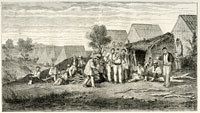In New Caledonia
In New Caledonia the French authorities could implement three different kinds of punishment. The most extreme was forced labor and detention in a penitentiary (bagne).
The Algerians were exempted from this punishment. A less harsh punishment was being confined to an enceinte fortifiée, a fortified bulwark. The peninsula of Ducos was designated as such a bulwark because it could easily be cordoned off from the main island.
The well-known leader of the Commune Louise Michel, was sentenced to enceinte fortifiée. The third and lightest category was déportation simple, deportation alone. The majority of the Algerians and 3,000 others were simple deportees.
 The convicts of the second and third categories were supposed to participate in a colonization project. They were to play a role in populating and opening up the land in this overseas territory that had only recently been confiscated by the French. The colonists were paid a small salary of one franc a day. There was work to do in the tin and cobalt quarries, in road construction, and in cultivation of the land. According to the register, the Algerians had either a military or an agricultural background. They settled in Gadgi (Ile des Pins) and cultivated small concessions, intended eventually to become their private property. Initially, they lived in a large common shed and where was a barrack used for praying, cooking, and meeting. Some of the deportees kept goats and sold goat cheese at the market. The Algerians were experienced horsemen and respected for their knowledge of horse breeding. Boumezrag El Mokrani, the brother of the sheik, owned a thriving grocery shop.
The convicts of the second and third categories were supposed to participate in a colonization project. They were to play a role in populating and opening up the land in this overseas territory that had only recently been confiscated by the French. The colonists were paid a small salary of one franc a day. There was work to do in the tin and cobalt quarries, in road construction, and in cultivation of the land. According to the register, the Algerians had either a military or an agricultural background. They settled in Gadgi (Ile des Pins) and cultivated small concessions, intended eventually to become their private property. Initially, they lived in a large common shed and where was a barrack used for praying, cooking, and meeting. Some of the deportees kept goats and sold goat cheese at the market. The Algerians were experienced horsemen and respected for their knowledge of horse breeding. Boumezrag El Mokrani, the brother of the sheik, owned a thriving grocery shop.
 Contacts between the French and Algerians were officially forbidden, but no one cared. Everybody knew shopkeeper Boumezrag, and Louise Michel and he were friends. Many French colonists were not satisfied with their daily portion of wine (a liter), so a lively market for wine emerged. Drunkenness (among the French), boredom, and the absence of female companions were continual problems in the colony.
Contacts between the French and Algerians were officially forbidden, but no one cared. Everybody knew shopkeeper Boumezrag, and Louise Michel and he were friends. Many French colonists were not satisfied with their daily portion of wine (a liter), so a lively market for wine emerged. Drunkenness (among the French), boredom, and the absence of female companions were continual problems in the colony.
